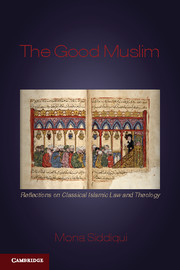Book contents
- Frontmatter
- Contents
- Acknowledgements
- Introduction
- 1 Spoken, Intended, and Problematic Divorce in Hanafī Fiqh
- 2 Between Person and Property: Slavery in Qudūrī’s Mukhtaṣar
- 3 Pig, Purity, and Permission in Mālikī Slaughter
- 4 Drinking and Drunkenness in Ibn Rushd
- 5 Islamic and Other Perspectives on Evil
- 6 The Language of Love in the Qur’ān
- 7 Virtue and Limits in the Ethics of Friendship
- Glossary
- Bibliography
- Index
5 - Islamic and Other Perspectives on Evil
Published online by Cambridge University Press: 05 July 2012
- Frontmatter
- Contents
- Acknowledgements
- Introduction
- 1 Spoken, Intended, and Problematic Divorce in Hanafī Fiqh
- 2 Between Person and Property: Slavery in Qudūrī’s Mukhtaṣar
- 3 Pig, Purity, and Permission in Mālikī Slaughter
- 4 Drinking and Drunkenness in Ibn Rushd
- 5 Islamic and Other Perspectives on Evil
- 6 The Language of Love in the Qur’ān
- 7 Virtue and Limits in the Ethics of Friendship
- Glossary
- Bibliography
- Index
Summary
Evil is the point where the perpetual contradictions of our existence intersect: our knowledge that we are free, our knowledge that we are not; our knowledge that we are masters and creators, and our knowledge that we are frail and transitory beings, feeble, multiply conditioned, and that our works along with ourselves are condemned to bear the stigma of futility.
(Gustave E.von Grunebaum)In contemporary philosophical and theological discourse there is a tendency to look at categories of judgement by pairing moral abstracts such as good and evil, justice and suffering or sin and salvation. While it is impossible to define such concepts in absolute terms, they are central in providing value judgements on human behaviour and the human condition. The monotheistic traditions of Islam, Judaism, and Christianity have explored these concepts within the God–man relationship and also in considering man’s earthly paradigm of loss and struggle. While these terms are often considered within the philosophies of the ancient world, they do assume a particular poignancy in theological deliberation. In an article written in 1938 John Bennett said:
Evil is the source of the most acute theoretical problem which Christians must face. Also, it is for many sensitive souls the most formidable practical obstacle to the religious life. But it must also be recognised that evil is the stimulus without which among men as they are there would be little religious faith at all. If there were no evil in the world the intellectual life of the Christian would run smooth but he would be so self-sufficient and would fit so comfortably in his environment that there would be little room for faith in anything but himself. The perspective that this fact provides is important as we face the problem of evil. A theology which does not take this problem seriously and throw all the light possible upon it must in time become bankrupt; but this perspective may give us patience as we discover that there are here dark places which no theology which has yet entered the minds of Christians can illumine.
- Type
- Chapter
- Information
- The Good MuslimReflections on Classical Islamic Law and Theology, pp. 106 - 136Publisher: Cambridge University PressPrint publication year: 2012



